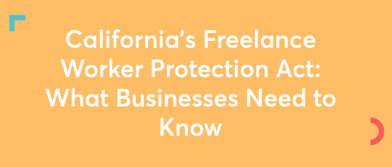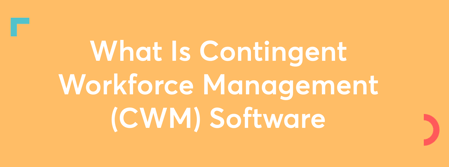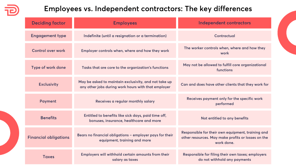Contractor compliance: All you need to know before engaging freelancers & contractors
- 7 Feb 2022
- 8 mins read
- Posted in
This blog post was updated on 10th of December 2024
What is contractor compliance?
Ask any manager what their biggest challenge is when working with freelancers and contractors. Chances are, their answer will have something to do with getting the actual work done – for example, briefing issues or deadline-related challenges or project planning and so on.
But there’s one aspect of freelancer engagements that often goes undiscussed – ensuring you hire contractors compliantly with compliance and contractor management solutions.
So what is contractor compliance? To put it simply, it refers to the legal and regulatory side of working with freelancers and contractors. It is the unseen cog in the machine that keeps the engagement operating smoothly. It has three major functions in this context – to ensure that you engage your external workers in a legal and compliant way, to make sure that your external workers adhere to regulatory requirements in their work, and to keep your company adequately protected just in case they aren’t.
All you need to know before engaging freelancers and contractors
What a lot of employers don’t realize is that compliance starts before external workers are engaged – not while the project is ongoing, and certainly not months down the line when the auditors happen to ask for some details! There are 2 essential things you need to ascertain before engaging someone:
The nature of work
This will determine the type of worker you’ll need to engage. External workers necessarily work on their own time, managing their tasks as they see fit. As a client, you can only control the results they produce. But if you need the worker to be available at a certain time or in certain places, or work in a particular way, you will need to hire an employee instead.
Location – yours and your workers’
This will determine the laws your engagement will be governed under. Given that you might be working with contractors around the world, you may need to gather the right documentation and paperwork at the time of hiring your freelancers and contractors in order to adhere to the relevant compliance laws.
How do contractor compliance solutions work?
In most cases, even today, it’s still the individual managers who are in charge of the compliance and contractor management engagement. They hire external workers, get the work done (often through email or verbal agreements) and then simply forward the invoice to the accounts department – all without the HR or legal teams getting involved at all.
But this means that nobody is really ensuring if laws and regulations are being adhered to. So how can compliance be ensured? Contractor compliance solutions and a streamlined hiring process is key here.
That would ensure that a formal contract is signed every time a new external worker comes on board. This contract should outline every aspect of the engagement – from what work the external worker is expected to do to deadlines, payment terms and everything in between. It should also set out the terms of accountability, outlining the legal and ethical responsibilities of both parties and ensuring that everyone knows what their liabilities will be, should they fail to meet them.
A streamlined hiring process would also ensure that all the right documents are gathered and stored in an organized manner, the necessary verifications are conducted, and the proper payment channels are set up.
Underlining all of these is the fact that the HR and legal departments would have to be a lot more involved in the process. After all, every individual manager would hardly know how to draw up a contract or what intricacies of employment regulations need to be kept in mind!
Contractor compliance checklist
-
Hire contractors compliantly
Ensure that your freelancer and contractor hiring process is managed in a compliant way. This means putting together a project description that is inclusive, transparent and accurate regarding the details of the work and pay. It means ensuring that your interviews and other subsequent rounds are carried out in an equitable and bias-free way.
-
Project compliance
This involves ensuring the contractor has all the necessary skills and training required to meet the needs of the project. This is where you might ask for documents like a resume, portfolios, work samples, client references and more.
-
HR compliance
Once the contractor has passed the checks in the previous round, it’s time to ask them to submit the details and documents for a compliant HR onboarding. This includes personal information, contact details, KYC documents, tax registration numbers etc.
-
Legal compliance
Next, the contrgenactors will need to sign and submit the necessary legal paperwork. This refers to the formal contract, NDAs, confidentiality clauses, a scope of work document and other forms as advised by your legal team or Agent of Record.
-
Payroll compliance
Here, you will need to collect your contractor’s bank account information and payment details. For international contractors, you may need additional transfer codes and currency details. Don’t forget to check with your payroll team whether the portal they use is able to support compliant payments to the relevant country.
-
Tech compliance
Finally, check if the contractor has the necessary software licenses and training certificates as needed for your project. As external contractors, they are responsible for having the right licenses and permits in place before the start of the project.
Reasons to explore a contractor compliance management system
1. Ensure correct employee classification
The first advantage of having a well-defined contractor compliance management protocol is that it helps you understand what category your external workers fall in. For example, freelancers and self-employed contractors whom you work with as and when new requirements come up, will largely be classified as independent or 1099 contractors. But if you engage an external worker through an outsourcing agency for a specific time period (say, several months at a go), they will likely be categorized as a W-2 contractor. You must also take care to ensure that your employees are not misclassified as contractors.
The reason you need to be extra cautious about these classifications is because all of these categories have distinct legal and tax implications – both for you as the client, and for the workers themselves. A simple, careless misclassification can lead to the worker falling under the scope of laws like IR35, which can cost them hundreds of pounds in extra taxes. And if these misclassifications are discovered in an audit later, it could mean hefty fines for your organization too.
If the freelancer or contractor you’re working with is from a different country, the compliance laws there might be completely different. Proper contractor compliance management will ensure that you collect the right documentation and, with the help of the relevant experts in your organization, classify your workers correctly.
Take our 1-minute contractor classification quiz here📝
2. Formalize the way you work with contractors
Misclassification of workers doesn’t just become a problem when tax season rolls around – it impacts your day-to-day engagements with your external workers too.
Freelancers by definition, are quite different from employees, and cannot be asked to work in the same way. For example, you can set your employees’ work hours, ask them to work from certain locations or disallow them to take up other employment as long as they are a part of your organization. But you cannot legally ask your freelancer to do these things. In fact, freelancers are not obligated to take up an assignment every time you reach out to them either – they are entitled to accept work based on their availability. On your part, you are not obligated to continue working with them or provide a steady stream of work.
These boundaries can be accidentally overstepped too – and there are lots of nuances to this. Freelancers are not entitled to perks and benefits for instance, so a friendly offer to let them use your company gym can cross this boundary.
Having a formal contract helps here by clearly outlining the expectations on both sides. It states what you expect your freelancers to deliver – and as long as those goals are being met, you cannot dictate where, when or how they work. A contractor compliance management system helps you keep track of this.
3. Get payments right
As per your contract with your external workers, you will be required to pay them within a certain number of days once you receive their invoice. Unfortunately, this becomes a stumbling block for many client companies because their payment systems are set up exclusively for salaried employees. Stray invoices get buried in a manager’s inbox, get misplaced as it moves from them to the accounts team or face processing delays where cross-border payments are involved.
A good contractor compliance software helps you avoid this as it stores their bank details, tax information and other data right when the worker is onboarded. This means managers will not have to scramble around for this information to forward to the accounts department, every time a new invoice has to be paid. Some contractor management systems also automate payments so that invoices are seamlessly processed as soon as the manager hits ‘Approve’.
4. Keep your organization protected
When you outsource a certain task to an external worker, you are trusting them to adhere to certain legal and ethical standards. For example, you expect them not to plagiarize content, use illegal software in its creation, leak proprietary company information to unauthorized people among other things.
Here again, NDAs and contracts help you ensure that they understand and agree to these conditions and are legally bound to adhere to them. Moreover, this helps protect your organization, in case any such breaches take place without your knowledge. The degree to which your company is protected may differ based on country and jurisdiction, so an expert may help you understand your liabilities better.
A contractor compliance management system is useful because it helps you keep track of which freelancers and contractors have submitted these documents. People often don’t notice a gap in documentation until something goes wrong – and only then do they realize that a particular NDA or contract was never signed. However, with a compliance system, you can spot the gap right away and get that rectified before any issues arise.
In some countries, everybody working with an organization (even contractors and temporary workers) is required to go through certain induction protocols like attending fair treatment seminars, anti-harassment training sessions and so on. A contractor compliance management system also helps you keep track of these.
5. Protect your contractor data
Freelancers and contractors need to submit a lot of personal and sensitive information like social security numbers or tax details. However, as per certain laws like the General Data Protection Regulation (GDPR), they are entitled to demand that this data be well protected. Compliance here would mean that you take adequate measures to store this data safely in a secure server – like the kind a contractor management system provides.
When there are no streamlined processes for onboarding external workers, this sensitive information is often stored in a disorganized way, across various spreadsheets and inboxes. Now imagine a manager has their system stolen, and all that sensitive information is suddenly left vulnerable. Should such eventualities come to pass, it could open up your company to fines or legal action.
Why TalentDesk's contractor management system is the perfect answer
Here at TalentDesk, our decades of experience in this space has enabled us to create truly comprehensive contractor compliance solutions and software that can handle every aspect of a freelancer or contractor engagement. Here’s how it helps you tick all the boxes on your contractor compliance checklist:
- Onboarding: TalentDesk’s streamlined onboarding process ensures that all the relevant data is collected, and there are no gaps in documentation. This makes it a breeze to classify your external workers correctly and set expectations accordingly.
- Storing information: Once all the documents are gathered, our system encrypts and stores all that sensitive data in the cloud. This means you automatically comply with data protection laws without leaving any room for errors or accidents.
- Sharing information: When you are working with freelancers, you often need to share confidential files, raw client data and other proprietary information with them in order to enable them to do their job. But simply mailing them or sending them through a chat app can lead to data leaks and breaches, thus causing you to violate the confidentiality clauses you have with your client. TalentDesk offers a great alternative with its organized, secure and centralized communication platform, thus allowing you to ensure compliance, even as you share information.
- Automating payments: Our seamless payment capabilities allow you to make payments across geographies quickly without having to worry about cross-border regulations, exchange rates and currency conversions, every single time. Our compliance and contractor management software enables your external workers to generate worksheets directly on our platform, so you don’t have to deal with a surge of invoices at the end of each month. Our system consolidates all approved worksheets and generates a single invoice for you to pay. It then distributes the correct amounts to each freelancer in a safe, compliant way, no matter where in the world they are based.

The futuristic take on contractor compliance
In today’s changing work environment, more and more companies are turning to external workers to scale effectively and ensure business continuity. The way contractor compliance is managed thus, also needs to change with the times. It should obviously not be handled as an afterthought – but neither should it be so cumbersome that it negates the flexibility and ease that are the very essence of contractor engagements. An automated and comprehensive system like TalentDesk thus, offers the ideal solution. As an added bonus, it can also help you manage your contractors and freelancers, and get the best out of them!

Sanhita Mukherjee
Speak to us to find out how we can help you manage your contingent workforce more efficiently
Related articles
What is a Vendor Management System (VMS)? A Complete Guide
What is a Vendor Management System (VMS)? A Complete Guide
Discover what a Vendor Management System (VMS) is and why it’s essential for managing your workforce. Streamline vendor management with ease.
Best Contractor Management Software for 2025
Best Contractor Management Software for 2025
Discover the best contractor management software to streamline workflows, ensure compliance, and simplify payments. Manage global contractors with ease.

What is a Contractor Of Record (COR)?
Discover the role of a Contractor of Record (COR) – Learn how a COR streamlines contractor compliance and safeguards your business legally.

California’s Freelance Worker Protection Act: What Businesses Need to Know
Learn how California’s Freelance Worker Protection Act (FWPA) impacts your business with compliance requirements, payment rules, and penalties.

Mastering Influencer Management: Strategies for Effective Collaboration
Our guide to influencer management, exploring strategies, tools, and tips to create successful influencer relationships and enhance your marketing impact.

10 Reasons Why You Don’t Need a Contractor Management System
Discover 10 hilarious reasons why you absolutely don’t need a contractor management system - because who needs efficiency, happy freelancers, or sleep?

What Is Contingent Workforce Management Software?
Discover how contingent workforce management software enhances cost savings & access to talent. Learn about essential tools, compliance & best practices.

The Hidden Complexities of Independent Contractor Classification
Read the complexities of independent contractor classification in our guide. Stay ahead with expert insights into evolving rules, tools, and future trends.

Deel vs. the Competition: Discover the Best HR Software Alternatives
Discover the best Deel alternatives for global HR management. Compare features, pricing, and reviews to find the best solution for your global workforce.
The Ultimate Guide to External Game Development
The Ultimate Guide to External Video Game Development
Explore our ultimate guide on external game development, covering crucial strategies, tools, and tips to manage freelance developers efficiently.
